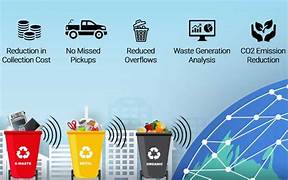The Use of AI in Improving Urban Waste Disposal Systems
Urban waste disposal is one of the most pressing challenges facing cities worldwide. With ever-increasing populations, urbanization, and consumption, cities are producing more waste than ever before. Traditional waste management methods, such as manual sorting, inefficient waste collection routes, and poorly optimized landfills, are no longer sufficient to keep up with the demand. In response to this challenge, artificial intelligence (AI) is emerging as a powerful tool to revolutionize the way cities manage and dispose of waste. From optimizing collection routes to automating sorting processes, AI is enhancing efficiency, reducing environmental impact, and improving the sustainability of urban waste systems.
This article explores the role of AI in urban waste disposal, highlighting the current challenges, AI-driven solutions, and the potential benefits and ethical considerations of implementing AI in waste management.
Current Challenges in Urban Waste Disposal
Urban waste management is a complex and multifaceted process that involves collecting, transporting, sorting, recycling, and disposing of waste. In many cities, waste management systems are inefficient and struggle with various challenges:
- Overburdened Systems: As populations grow, waste production increases, leading to overburdened infrastructure. Many cities have outdated systems that can’t cope with the volume of waste being generated, resulting in overflowing landfills and unsanitary conditions.
- Inefficiency in Collection Routes: Waste collection vehicles often follow fixed routes, regardless of how much waste is actually generated in certain areas. This leads to unnecessary fuel consumption, longer travel times, and increased carbon emissions.
- Manual Sorting and Recycling: Sorting waste at recycling facilities is still largely a manual process, which is not only time-consuming and labor-intensive but also error-prone. A significant portion of waste that could be recycled ends up in landfills due to improper sorting.
- Lack of Data and Analytics: Many waste management systems lack the necessary data and analytics to make informed decisions. Without insights into waste generation patterns, it’s challenging to predict demand, optimize resources, and plan for future needs.
- Environmental Impact: Inefficient waste disposal practices contribute to pollution, greenhouse gas emissions, and the depletion of natural resources. Reducing the environmental impact of waste management is essential for achieving sustainability goals.
How AI is Transforming Urban Waste Disposal Systems
AI is transforming urban waste management by enabling smarter, more efficient, and more sustainable systems. By leveraging AI technologies such as machine learning, computer vision, and data analytics, cities can improve waste collection, sorting, recycling, and disposal. Here are some ways AI is being used to enhance urban waste systems:
1. Optimizing Waste Collection Routes
One of the most significant applications of AI in waste management is route optimization for collection trucks. Traditional waste collection routes are often based on fixed schedules and geographical areas, regardless of the actual volume of waste in specific locations. This results in unnecessary trips, increased fuel consumption, and higher emissions.
AI-powered systems, however, can analyze real-time data from sensors on waste bins, as well as historical waste collection data, to determine the optimal routes for waste collection trucks. These systems can predict the level of waste in different bins, allowing trucks to only visit locations where they are needed. By optimizing collection routes, cities can reduce fuel consumption, lower emissions, and increase overall operational efficiency.
For example, AI algorithms can analyze traffic patterns, weather conditions, and waste levels to suggest the most efficient routes for waste trucks, reducing delays and improving the punctuality of waste collection services.
2. Automating Waste Sorting with AI
Sorting waste for recycling is one of the most critical steps in the waste management process, but it is also one of the most challenging. Traditional waste sorting methods rely heavily on human labor, which is slow, inefficient, and prone to errors. In addition, contaminants—such as food waste or non-recyclable materials—can significantly reduce the quality of recycled materials.
AI, specifically computer vision and machine learning algorithms, is transforming waste sorting by automating the process. AI-powered robotic arms equipped with cameras and sensors can identify and sort materials at high speeds. For example, AI can distinguish between plastics, metals, glass, and paper, and sort them accordingly into designated bins. This not only speeds up the recycling process but also reduces contamination, leading to higher-quality recycled materials.
Moreover, AI systems can learn from past sorting tasks and improve over time, increasing accuracy and efficiency. By automating waste sorting, cities can recycle more materials, reduce the amount of waste sent to landfills, and conserve natural resources.
3. Predicting Waste Generation and Optimizing Resources
AI can help cities better understand waste generation patterns by analyzing vast amounts of data. By leveraging historical data, sensors, and machine learning algorithms, AI systems can predict when and where waste is likely to be generated. This allows waste management companies to optimize the allocation of resources, ensuring that the right number of trucks and workers are deployed in the right areas at the right times.
For example, AI can predict spikes in waste generation during holidays or special events and adjust collection schedules accordingly. It can also help cities manage seasonal waste, such as leaf collection in the fall or snow removal in the winter. By predicting waste patterns, cities can avoid over-staffing or under-staffing and ensure that resources are used efficiently.
Furthermore, AI can assist in the design and management of waste infrastructure. By analyzing data on waste generation and disposal, cities can identify areas where additional waste bins or recycling stations are needed, helping to reduce waste overflow and encourage recycling.
4. Improving Landfill Management and Resource Recovery
AI technologies can also improve the management of landfills and resource recovery processes. AI-powered systems can monitor landfill conditions in real-time, detecting potential issues such as methane emissions or ground instability. Machine learning algorithms can predict when a landfill may reach its capacity and help cities plan for the decommissioning or repurposing of these sites.
Additionally, AI can be used to optimize resource recovery from landfills. For example, AI systems can help identify valuable materials in landfills that can be extracted for reuse, such as metals, plastics, and rare earth elements. By improving the efficiency of resource recovery, AI can help cities reduce waste and promote a circular economy.
5. Promoting Public Engagement and Awareness
AI can also be used to engage the public in waste reduction and recycling efforts. Many cities are using AI-powered chatbots and mobile apps to provide residents with real-time information about waste collection schedules, recycling guidelines, and waste diversion programs.
These AI tools can also help raise awareness about waste-related issues, such as reducing single-use plastics or composting organic waste. By providing users with personalized recommendations and feedback, AI can encourage better waste management practices and improve overall participation in recycling programs.
For example, AI-based apps can remind residents to recycle, offer tips on waste reduction, and track individual recycling efforts, helping to foster a sense of responsibility and community involvement in waste management.
The Benefits of AI in Waste Disposal
The integration of AI into urban waste management systems offers several key benefits:
- Environmental Sustainability: AI-driven systems help cities reduce waste, improve recycling rates, and lower carbon emissions, contributing to a more sustainable urban environment.
- Cost Efficiency: AI can reduce operational costs by optimizing waste collection routes, reducing fuel consumption, and improving resource allocation.
- Improved Public Health: AI can help prevent waste-related issues such as overflowing bins and unhygienic conditions, contributing to cleaner and healthier urban spaces.
- Data-Driven Decision-Making: AI provides valuable insights into waste generation patterns, helping cities make informed decisions about waste infrastructure and policy.
- Resource Conservation: AI helps recover valuable materials from waste, promoting a circular economy and reducing the need for virgin resources.
Ethical Considerations and Challenges
While AI offers tremendous potential in improving urban waste disposal systems, its implementation raises several ethical considerations and challenges:
- Data Privacy: The use of sensors and AI-powered systems to monitor waste generation patterns raises concerns about data privacy. Cities must ensure that personal data is protected and that AI systems comply with privacy regulations.
- Job Displacement: The automation of waste sorting and collection could lead to job displacement for workers in the waste management industry. It’s essential to provide retraining and reskilling opportunities for affected workers.
- Bias in AI Systems: AI systems are only as good as the data they are trained on, and biased data could lead to discriminatory outcomes. Ensuring that AI systems are trained on diverse and representative data is crucial for fairness.
- Access and Equity: The implementation of AI in waste management should be equitable, ensuring that all communities—especially underserved or marginalized ones—benefit from improved waste services.
Conclusion
AI is revolutionizing urban waste disposal systems by improving efficiency, sustainability, and resource management. From optimizing collection routes to automating waste sorting and enhancing recycling efforts, AI technologies offer significant potential for transforming waste management practices. However, the adoption of AI must be done thoughtfully, with attention to ethical considerations such as data privacy, job displacement, and equity. By leveraging the power of AI, cities can create smarter, cleaner, and more sustainable urban environments, contributing to a healthier planet for future generations.


